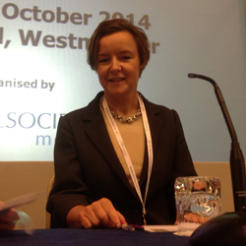Paula Sussex, the chief executive of the Charity Commission, has said the Commission is now focusing on "robust regulation" and will not allow charities the benefit of the doubt.
Sussex told delegates at the Charity Finance Summit in London this morning that the regulator is becoming “tougher, smarter, more agile and more proactive” under her watch.
Charities are facing greater scrutiny from the media and members of the public are less likely to give charities the benefit of the doubt, she said, so the Commission cannot continue to do so either.
Opening Civil Society Media’s event at Central Hall Westminster in her first external speaking engagement since taking on the role of chief executive at the end of June, Sussex said that the Commission’s strategic role has changed as it moves to become a more effective regulator.
She told delegates that when she started in the job she believed that the organisation was a proactive regulator, but now realises it was not.
"Before I joined the Commission I fondly imagined that as a regulator it was proactive, that it was able to take on an intelligence-led or a risk-based approach, that it had the ability to protect, prevent, interrupt any finances or other types of abuse. Actually this was not the case," she said.
Sussex continued: "Up to a year ago that regulator had been exclusively reactive, so in other words it was reliant on media activity and complaints, and it had no way of going out there to detect."
She said that two ways the Commission has restructured to become a more proactive regulator is by establishing an operations team who makes contact with charities based on themes or indications, and with a more proactive scrutiny of accounts.
"My job as chief executive is to make sure the Commission becomes the most effective regulator possible, in accordance with our resources, so that we fulfil our role in upholding and promoting [public] trust. And that means getting better, tougher, smarter, more proactive and more agile,” she said.
Sussex went on to say that the Commission is making “rapid progress in becoming a more robust regulator and in responding to the criticisms that have been made” of it.
In 2013-14, 64 statutory inquiries have been opened, compared with 15 the previous year. She said that this was despite the Commission’s annual budget being cut by around 50 per cent in real terms since 2007.
She spoke about the impact of the increased media scrutiny that charities have received in recent months and years.
How charities are run is becoming of greater interest to journalists, and while the media attention is not always fair, this does not excuse charities' inappropriate responses, she said.
Sussex went on to praise the NCVO for its response to the media focus on executive pay in setting up its pay inquiry and publishing guidance for charities. She said that if public trust is to be maintained, the sector will need to see more such bold leadership from charity groups in the future.
Sussex also told the finance professionals present that public trust is a joint responsibility between the Commission and charities.
She said: “Each individual charity must respond to public expectations and ensure they do their bit to uphold public confidence in their organisation and the sector itself.”
Restructure of senior management team
Sussex also elaborated more on the restructure of the senior managers at the Commission, which she had previously mentioned at the Charity Commission’s annual public meeting.
She said that the board had identified five senior management posts, to which the Commission is recruiting for at the moment. Sussex said it was vital that the Commission had the right skills among its staff, and invited the assembled delegates to consider whether their own skills might be of use to the regulator.
Sussex said: "So not that I am standing here on some kind of recruiting stall but if any of you are interested in a short period of stay within the Charity Commission on secondment I'd be absolutely delighted to hear from you."
The senior management team has been restructured from 11 down to five.









